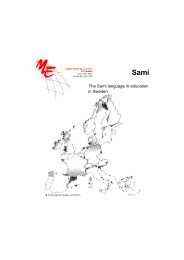Multilingual Early Language Transmission (MELT) - Mercator ...
Multilingual Early Language Transmission (MELT) - Mercator ...
Multilingual Early Language Transmission (MELT) - Mercator ...
Create successful ePaper yourself
Turn your PDF publications into a flip-book with our unique Google optimized e-Paper software.
in the overall toolkit. Some of the activities were offered bilingually (Breton-French). The<br />
strategy ‘one person one language’ seems difficult to integrate in some provisions.<br />
One setting mentioned that it was often difficult to adapt the activities to the smallest<br />
children (1-2 years, if not under 1 year-old). The activities are too much intended for<br />
‘schools’ (3 years and older).<br />
According to one of the practitioners it would also be good to include new words and new<br />
terms in the theme, either in the minority language or in both languages. During the <strong>MELT</strong><br />
project the amount of Breton vocabulary to be offered to all children has increased.<br />
One setting will consider discussing what they do on an everyday basis for the language in<br />
general and how the pre-school teacher who is able to speak Breton, can go ahead with this.<br />
One setting mentioned that they learnt a lot regarding the consciousness of the<br />
professionals and the importance of parents participating in the pre-school activities.<br />
One provision recorded their own CD with songs in French and Breton.<br />
The tutor stresses the fact that team work and a positive language attitude towards Breton<br />
is essential. Some settings need to work on that. Team work has to be more focused and<br />
practitioners have to agree with the strategies they use within their pre-school.<br />
5.3 Skills of training staff: mentors and practitioners<br />
There has to be good training programmes for both pre-school and immersion<br />
practitioners/teachers. A training program focusing on three competencies: linguistic,<br />
scientific and pedagogic (Obadia in Arnau & Artigal, 1998). The pre-school teachers of<br />
nurseries/kindergarten are naturally present in all activities together with the children. They<br />
help children to dress, undress, to eat etc. If the pre-school teacher uses a pedagogical<br />
approach there is a more communicative role on the part of the teacher: more collaborative,<br />
and more conducive to a varied input (Arnau & Artigal, 1998). The University of Barcelona<br />
studied the Pedagogical Approach, Context and <strong>Language</strong> in <strong>Early</strong> Catalan Immersion and<br />
came to the conclusion that a pedagogical approach, more pupil centred, provides a richer<br />
mental ‘context.’ This approach promotes a more active use of the language, and also<br />
develops the communicative competence of pupils. A pedagogical approach of the language<br />
will promote a faster and more effective acquisition of the second language (Arnau & Artigal,<br />
1998).<br />
The profile of a good teacher in early language learning includes not only language<br />
competence but also the specialist skills and knowledge of an effective nursery, infant or<br />
primary teacher. The teacher has a central role as he/she is likely to be the main source of<br />
input in the target language. He/she is also bringing an intercultural dimension to the<br />
learners, helping them to learn about languages (i.e. developing language awareness, as well<br />
as developing strategies for language learning which will help in later life. The teacher also<br />
76



